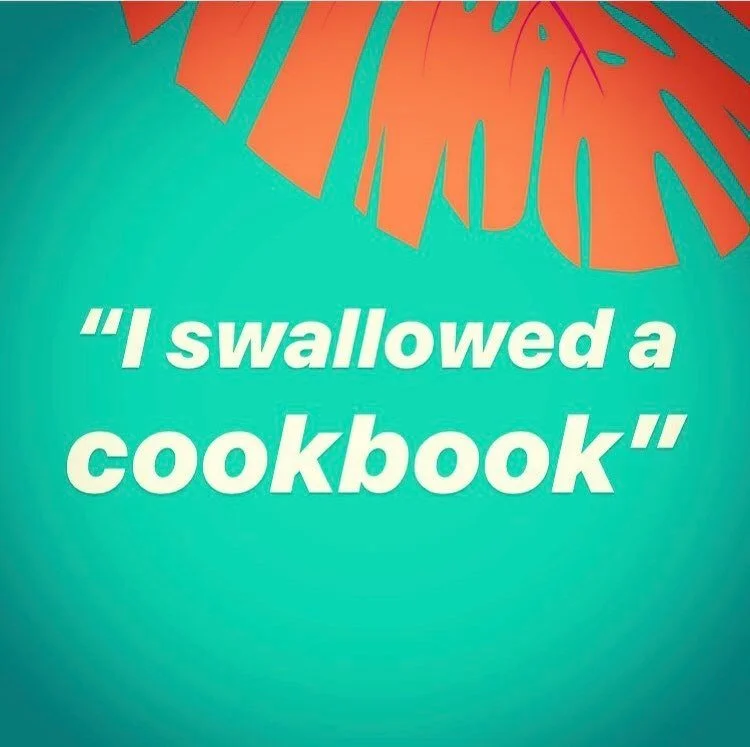kaloungie
Image description: light and dark contrast of teal background with orange leaf. Text reads "I swallowed a cookbook."
“I got tired of cooking the same things over and over. And Muddie had forgotten about a thin blue hard-covered West Indian cookbook hidden in one of the cardboard boxes. The first day I made coo-coo with ochroes and cornmeal out of the cookbook I got a terrible boof and nobody would touch it. They said it looked stiff and slimy and that the stewed saltfish was too oily. Late as it was, Muddie had to quickly make up some sada roti and butter for them. It was Da Da who saved me. His gambling job finished late that night and he came home hungry. He ate and ate and ate. Muddie must have been watching him suspiciously because I heard the hiss in her voice, "Yuh know bout coo-coo? Where yuh know bout coo-coo?" I was still doing home-work on the big table outside and listened attentively. I had heard a neighbour whispering to Muddie that Da-Da had a Creole woman and that it wasn't really the gambling job that took up so much time. When he had finished eating, Da-Da called me and gave me a big hug. That was my licence to practise.
After that nothing was too hard for me, after all I had already swallowed a cookbook. Paimie or blue drawers, pastelles, callaloo, and shark-fin soup mixed up with dhal and rice and fried bodi with pigtail, dumplings and stew beef, macaroni pie with stewed dhal and tomato chokha. Pinwheel rolls, chequered cakes, steamed cucumber slices with cheese and lemon, stuffed eggplant au gratin. The day I made kitcheree for Good Friday I was proud, proud. I didn't get that in any cookbook. It was Mousie from the country who came on a visit and told me how to do it. Mud die didn't know too much about real Indian food and there were no cookbooks for that. I added shrimps to Mousie's recipe and served it up with tomato chokha on the side.
One day I noticed that a set of vines had started to run on the wall behind the back steps. In Biche we had endless vines and bush. We used to make wild cucumber chow, suck the bright red seeds of wild carilees, eat fat-pork off the bushes, and make juice from inkberries. La Plata was boring. The vines on the wall were almost all old bush, I thought, until I saw some bright red color peeping through.
It was the tiny wild carilees, finding their way from Biche to La Plata, laden with small firm fruit. Only Papa ate fried carilees because he said they were good for high blood-pressure, cancer and rheumatism. But the only thing we had for dinner that day was rice and dhal so I tore down about two dozen small carilees and curried them with black massala and little red bird peppers. Everybody ate. Some days later I tried my hand at kaloungie because Papa had said, "If yuh could cook massala carilee so good, yuh might even manage kaloungie." Papa could cook only one thing- thin crisp kurma that Sonia called sugar sticks. But he knew what kaloungie looked and tasted like and explained it.
Quickly, and disgorging from the insides of my big cook book, I worked backwards. The first time the kaloungie stuck to the pot and got black all over and very dry. But the second time it was perfect, stuffed on the inside, crispy succulent and slightly burnt on the outside. After that I knew I could cook anything.”
-Indian Cuisine, by Ramabai Espinet. The Massachusetts Review (1994) Ramabai Espinet is a poet, a writer of fiction and essays, a critic and an academic from San Fernando, Trinidad and Tobago.
